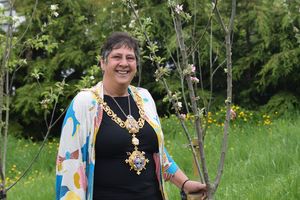15,000 trees planted in Keighley to reduce flood risk and mitigate climate change
15,000 trees have been planted in Keighley to reduce flood risk and mitigate climate change as part of a Natural Flood Management Programme which aims to reduce flood risk in the River Aire catchment.

Lady with floral jacket and mayoral necklace holds a tree in hand ahead of planting in parkland in background.
The project, which is being led by the Environment Agency in partnership with Leeds City Council, is part of the Leeds Flood Alleviation Scheme Natural Flood Management (NFM) project, one of the largest NFM projects in the UK.
The newly planted trees will help reduce the risk of flooding locally and downstream and also enhance the town’s green spaces.
A mix of birch, beech, oak, aspen, rowan, hornbeam, small-leaved lime and wild cherry were planted on six hectares at Damems Lane and Guardhouse Allotments.
Together with traditional engineering measures, between Leeds city centre and Apperley Bridge, 1,048 homes and 474 businesses will be better protected from flooding.
Fiona Sugden, Environment Agency’s Leeds NFM Project Manager, said:
The creation of the new woodland areas will have multiple benefits for people and wildlife. Not only will they reduce flood risk locally and downstream in Leeds - they will also benefit the environment by creating new woodland habitat, boosting biodiversity, mitigating climate change and creating new green spaces for people to enjoy.
Tree planting provides so many benefits that we’ll continue to work with Keighley Town Council to identify opportunities in the future.
Keighley Town Council Mayor, Councillor Julie Adams, said:
My fellow councillors and I are serious about addressing the issue of climate change. We believe that reducing global warming is everyone’s responsibility and that the best way to help local people to make a difference is to set practical examples of good practice and support activities that involve local people in taking action within their own neighbourhoods.
We have been committed to the creation of cleaner greener and safer communities since declaring a climate change emergency in July 2019 and a key objective of our Climate Change Action Plan is to significantly increase the number of trees planted within the Keighley Town Council Parish, create more wildlife habitats and conservation areas whilst significantly reducing the risk of flooding.
We are therefore delighted to have teamed up with the Environment Agency to create a fantastic lasting and inspirational resource for future generations.
Councillor Helen Hayden, Leeds City Council’s Executive Member for Infrastructure and Climate, said:
Taking a catchment wide approach to flood risk management has meant we have looked at the whole of the River Aire catchment to provide cross cutting benefits.
Planting trees in Keighley will not only bring environmental benefits locally but it will also make a big difference further downstream in Leeds as trees help to slow and store the flow of heavy rainfall and flood waters. This is critical if we are to build our resilience to climate change and reduce the risk of flooding to communities.
This natural flood management project forms part of the second phase of the Leeds Flood Alleviation Scheme, which is being led by Leeds City Council, working with the Environment Agency. This phase got underway in 2019 and aims to invest £112.1 million in flood prevention measures for areas upstream of Leeds city centre, to better protect 1,048 homes and 474 businesses.
Natural Flood Management offers potential for climate mitigation, for example, creating wetlands, restoring our uplands and planting trees can help to capture tonnes of carbon from the atmosphere.
For more information about the Leeds Flood Alleviation Scheme visit www.leeds.gov.uk/fas.
If you have land and would like to know more about how you could be involved in an NFM project, please get in touch with the project team at: LeedsFAS.nfm@environment-agency.gov.uk
*[NFM] natural flood management